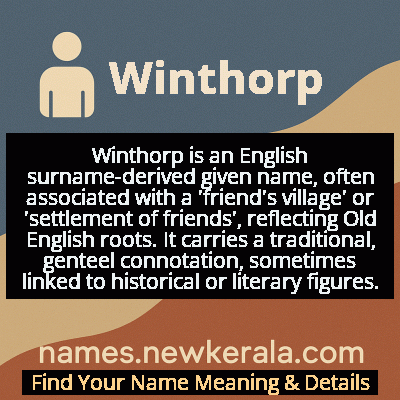Winthorp Name Meaning & Details
Origin, Popularity, Numerology Analysis & Name Meaning of Winthorp
Discover the origin, meaning, and cultural significance of the name WINTHORP. Delve into its historical roots and explore the lasting impact it has had on communities and traditions.
Name
Winthorp
Gender
Male
Origin
Christian
Lucky Number
6
Meaning of the Name - Winthorp
Winthorp is an English surname-derived given name, often associated with a 'friend's village' or 'settlement of friends', reflecting Old English roots. It carries a traditional, genteel connotation, sometimes linked to historical or literary figures.
Winthorp - Complete Numerology Analysis
Your Numerology Number
Based on Pythagorean Numerology System
Ruling Planet
Venus
Positive Nature
Harmonious, responsible, caring, and artistic.
Negative Traits
Overly idealistic, superficial, possessive, or jealous.
Lucky Colours
Pink, turquoise.
Lucky Days
Friday.
Lucky Stones
Diamond, turquoise.
Harmony Numbers
2, 3, 9.
Best Suited Professions
Artists, musicians, teachers, healthcare workers.
What People Like About You
Warmth, nurturing nature, artistic flair.
Famous People Named Winthorp
John Winthrop
Political leader
First governor of Massachusetts Bay Colony and key figure in Puritan migration to New England
John Winthrop Jr.
Scientist and governor
Founder of several Connecticut towns and early American alchemist and scientist
Robert Charles Winthrop
Politician
Speaker of the U.S. House of Representatives and Massachusetts Congressman
Theodore Winthrop
Author and soldier
Early American novelist and one of the first Union officers killed in the Civil War
Name Variations & International Equivalents
Click on blue names to explore their detailed meanings. Gray names with will be available soon.
Cultural & Historical Significance
The Winthrop family dynasty maintained cultural prominence for generations, producing governors, scientists, and intellectuals who shaped early American society. John Winthrop Jr., for instance, founded multiple Connecticut towns while pursuing alchemical and scientific studies that positioned him as one of colonial America's foremost intellectuals. The name became synonymous with Puritan values of hard work, education, and community responsibility while also representing the intellectual curiosity of the Enlightenment. Throughout the 19th century, Winthorp descendants continued to influence American culture through literature, politics, and education, ensuring the name's enduring association with leadership, tradition, and civic virtue in the American cultural imagination.
Extended Personality Analysis
Individuals named Winthorp typically exhibit a distinctive blend of traditional values and intellectual curiosity that makes them natural leaders and community pillars. They tend to be methodical, principled, and deeply committed to their responsibilities, often displaying the Puritan work ethic historically associated with the name. Winthorps are usually excellent planners and organizers, with a keen eye for detail and a systematic approach to problem-solving. Their strong moral compass guides their decisions, and they often become respected figures in their professional and social circles due to their reliability and integrity.
Beyond their practical capabilities, Winthorps frequently possess a philosophical depth and historical consciousness that informs their worldview. They tend to be well-read, particularly in history and classics, and often develop expertise in specific areas through dedicated study. While they may appear reserved initially, they form deep, lasting friendships and are fiercely loyal to those they trust. Their combination of analytical thinking and emotional depth allows them to excel in leadership positions where both strategic vision and interpersonal skills are required. Modern Winthorps often continue the family's historical legacy of community service, education, or public leadership while adapting traditional values to contemporary contexts.
Modern Usage & Popularity
In contemporary naming practices, Winthorp maintains its status as a distinguished but uncommon choice, primarily selected by families seeking a name with historical resonance and aristocratic bearing. According to recent naming statistics, the name appears fewer than 5 times per year in U.S. birth records, placing it firmly in the category of rare traditional names. Modern usage demonstrates interesting demographic patterns, with higher concentration among families with New England ancestry, academic backgrounds, or connections to historical preservation. The name has experienced a modest revival as part of the 'grandpa name' trend that has brought back other vintage appellations, though it remains significantly less common than similar-sounding names like Winston or William. Contemporary Winthorps often go by nicknames like 'Win' or 'Thorpe' in casual settings, while the full name is typically reserved for formal occasions. The name's continued usage, though limited, reflects an enduring appreciation for Anglo-Saxon names with clear historical narratives and substantial cultural weight.
Symbolic & Spiritual Meanings
Symbolically, Winthorp represents the intersection of community foundation and personal relationships, drawing meaning from its Old English roots of 'wine' (friend) and 'þorp' (village). The name metaphorically suggests someone who builds both social networks and physical communities, creating environments where relationships can flourish. In medieval symbolism, wine represented friendship, celebration, and covenant relationships, while the estate or village symbolized stability, inheritance, and territorial responsibility. Thus, a Winthorp symbolically becomes a steward of both social bonds and physical legacy.
The name also carries deeper metaphorical meanings related to American foundational mythology. Like the Puritan settlers who saw themselves establishing a 'New Jerusalem,' the name suggests visionary community-building and the creation of institutions meant to endure beyond a single lifetime. It symbolizes the translation of Old World values into New World opportunities, representing adaptation without loss of core identity. In psychological terms, the name suggests integration of tradition and innovation, personal conviction and community responsibility, making it symbolically rich for individuals who bridge different worlds or maintain continuity across generations. The enduring legacy of the Winthrop family adds layers of symbolic meaning related to educational pursuit, scientific curiosity, and civic duty that continue to inform the name's contemporary resonance.

